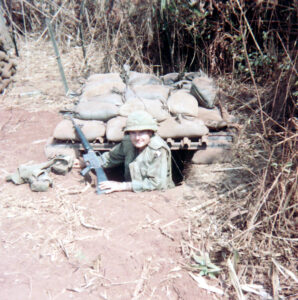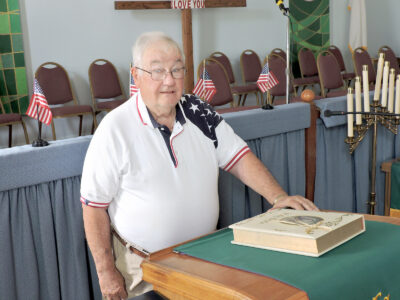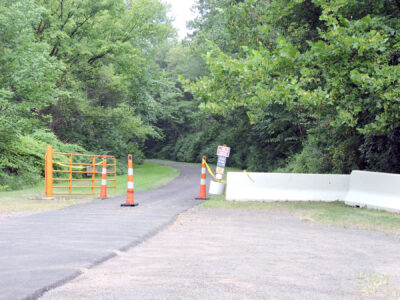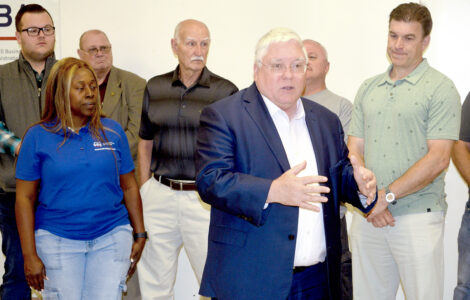Local pastor gathered military intelligence in Vietnam
- IN A TIGHT SPACE — Years before he entered the ministry, the Rev. Jim Rahr found himself in tight and dangerous places, like this foxhole, as a military intelligence specialist in the Army’s 101st Airborne Division in Vietnam. — Contributed
- SERVING GOD AND COUNTRY — The Rev. Jim Rahr, a Vietnam War veteran, stands at the pulpit where he preaches at Colliers United Methodist Church. — Warren Scott
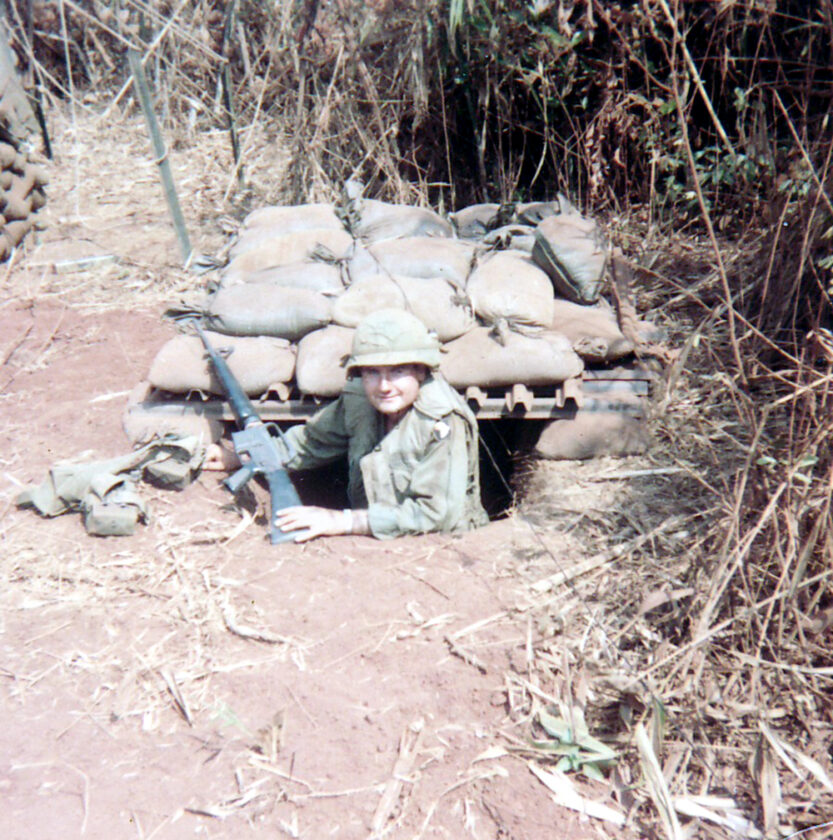
IN A TIGHT SPACE — Years before he entered the ministry, the Rev. Jim Rahr found himself in tight and dangerous places, like this foxhole, as a military intelligence specialist in the Army’s 101st Airborne Division in Vietnam. -- Contributed
COLLIERS — A local pastor’s assignment to the Army’s 101st Airborne Division during the Vietnam War led to his serving in various roles and places but not much time in the air.
The Rev. Jim Rahr, a licensed local pastor at Colliers United Methodist Church, acknowledged the division is known for its paratroopers but said the highest he jumped from an aircraft was about 6 feet from a couple of helicopters.
“They called me a leg because I didn’t jump, but I didn’t care because I did my job,” said Rahr, who explained he was in a military intelligence unit charged with gathering information helpful to the war effort.
While it didn’t put him in combat situations, it placed him under enemy fire at times.
Ironically, it was while undergoing basic training at Fort Bragg, N.C., in 1967 that he received the most harm.
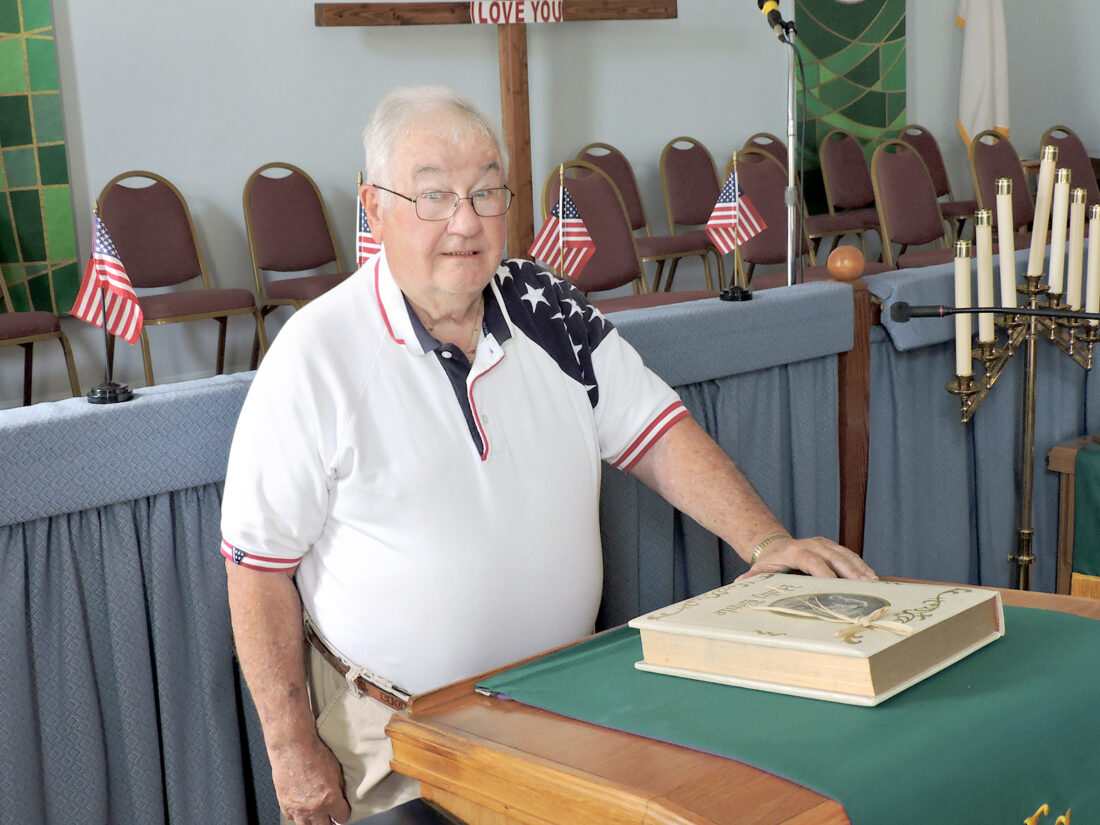
SERVING GOD AND COUNTRY — The Rev. Jim Rahr, a Vietnam War veteran, stands at the pulpit where he preaches at Colliers United Methodist Church. -- Warren Scott
Rahr said he had received a draft notice when he opted to enlist in the Army, a move he figured would give him more choice in his assignment.
He noted his father had served as a radio operator in the Army Air Force during World War II and remained in the service for many years, retiring as a young officer in the National Guard.
Rahr said while participating in night maneuvers, he pitched a tent under a bush. When he emerged from it, one of his eyes was struck by a stick in the bush, blinding him.
He said to his surprise, he also lost vision in the other, unharmed eye.
Doctors say that can occur because the body’s defenses mistakenly attack the unaffected eye or the optic nerve transmitting information to the brain has been damaged.
Rahr said he remained in an Army hospital for 14 days until his vision was fully restored.
After completing boot camp, he went to Fort Holabird, Md., where he received training in military intelligence and from there joined many other soldiers on a 23-day voyage to Vietnam aboard a crowded troopship.
Rahr said sleeping accommodations consisted of about six bunk beds extending from the floor to the ceiling, with little space between.
“Thank goodness I was the third one up,” he said.
After arriving near the South China Sea, he was among enlistees to draw straws to see who would accompany a tugboat-pulled barge carrying equipment to Phan Rang, a city in the coastal region of South Vietnam.
“Naturally, I drew the short straw,” said Rahr.
He noted the cargo included desks, bunks, tents and other materials needed for the troops’ encampment.
Rahr recalled the vessel rocking vigorously during the trip and becoming seasick for the first time while the air temperature reached as high as 108 degrees.
“When it rained, it was a chance for us to get a shower. But the rain was so cold, we couldn’t lather the soap,” said Rahr.
He said during the trip, a cable broke loose and the barge was adrift for three days.
When they finally were able to reach their camp, he and the other soldiers were arrested by Military Police for being Absent Without Leave and jailed for six hours until their commanding officer cleared things up.
Rahr’s job as an image interpreter involved studying aerial photos taken from aircraft over enemy territory for geographical features that could be helpful to the Army’s missions.
Later he was charged with serving as an interrogator for captured Vietnamese believed to have useful information.
A South Vietnamese ally served as the interpreter, but he and other interrogators were encouraged to learn about local customs that would help them to coerce their subjects.
Rahr said he learned young Vietnamese women wore their hair very long to indicate their virginity and short hair, before marriage, was seen by many as shameful.
He watched as an interrogator cut 3-inch segments of the hair of a beautiful young Vietnamese girl whose brother was believed to be in the Viet Cong, communist infiltrators of South Vietnam, until she divulged the information that was sought.
Rahr recalled bribing a 12-year-old Vietnamese boy with chocolate before he revealed areas where enemy troops had stashed ammunition and other supplies.
“I think it was eight different (ammo) dumps we found,” he said.
Rahr said he told commanding officers a certain Vietnamese interpreter was behaving strangely and was absent whenever the camp came under enemy fire, and the man was identified as a spy.
He recalled an officer placing a piece of bamboo partly under his fingernail while educating him in the ways the North Vietnamese may torture him if he were captured.
Rahr said of his tour of duty in Vietnam, “We didn’t sit around. We were moving from one end of the country to another.”
Rahr said often his sleeping quarters were foxholes. Seeing wooden skids in the vicinity, it occurred to him to place one at the bottom so if it rained, he could stand above the muddy pit.
Another time, he and the other troops were stationed in a bamboo forest with ground covered by a fine, red clay.
“Everything started to turn red. In a month, the vehicles were red, our clothes were red,” Rahr recalled.
They also endured three to four months of Vietnam’s monsoon season, during which a fine rain fell perpetually upon them.
“Nothing dried. There was no sunlight to dry anything,” he said, noting often he would replace a pair of soaked socks with others that were only slightly less wet.
“I went through three pairs of boots because they were waterlogged and fell apart,” said Rahr.
He recalled one day a soldier from Tennessee invited him to join him on an approved trip to a local town.
While they were taking the five-mile trek, his friend advised him put on his helmet because there was a sniper ahead.
“He never hit us, but he fired,” said Rahr.
Once in town, he was served for breakfast a stew that despite its green hue, was quite delicious. He asked what it was and was told repeatedly, “You don’t want to know,” until his hosts finally admitted it contained dog meat.
“From that point on, I never went back for breakfast,” Rahr said, noting he had a pet dog at home.
Also at home was his girlfriend and future wife, Geraldine Mains, to whom he had proposed by phone after he entered the service.
“I missed her so bad,” Rahr said.
He wrote hundreds of letters to her, sometimes two a day, and still has a box full of them.
Rahr said Geraldine also sent letters and packages containing cookies she had baked, but not all of them reached him.
“There were times when I wouldn’t get mail for five days because I was moving around,” he said.
Rahr had met her when he, at age 12, attended Follansbee United Methodist Church with his brother.
Following his discharge from the Army and return to the U.S., Rahr got a job working in a lab at the former Foote Mineral Co. in Mingo Junction until stricter environmental regulations led to that business closing and he was hired for the payroll department at the former Continental Can Co. in Weirton.
From there he went to work in a lab at the Follansbee Koppers plant, dividing his time between there and classes at West Liberty State College made possible through the G.I. Bill.
He was preparing for a career in teaching and completed his student teaching while working at Koppers.
And following his graduation from WLSC, now West Liberty University, he was offered a teaching job, but his current position paid more.
Rahr went on to a 36-year career with Koppers while his wife worked as a Brooke County schoolteacher for many years. They have two sons.
The couple also served as Sunday school teachers at their church, and he frequently attended religious conferences beginning in 1993.
He said it was while attending a summer event at West Virginia Wesleyan College in Buckhannon that he felt called to the ministry.
He became a licensed lay leader first and then a licensed local pastor, assisting another pastor in serving four churches in southern Brooke County, Western Pennsylvania and West Liberty.
After about a dozen years in the ministry, he retired at age 73, a year after Methodist ministers normally are required to retire.
But after he and his wife became members of Colliers United Methodist Church, he was asked to serve as its pastor and has served there for two years.
Through the years, Rahr has kept busy as a member of Masonic Lodge 181 of Bridgeport and served as president of the Northern Panhandle Shrine Club and in the Shriners’ Tin Lizzie Patrol as well as president of the former West Virginia chapter of the Sons of American Revolution.
Rahr said of his military service, for which he received a Bronze Medal for Meritorious Service, was key to his personal development.
He said he lacked confidence when he enlisted at age 20.
“I feel our nation gave me so much. It gave me pride in myself. It made me a man,” said Rahr.

